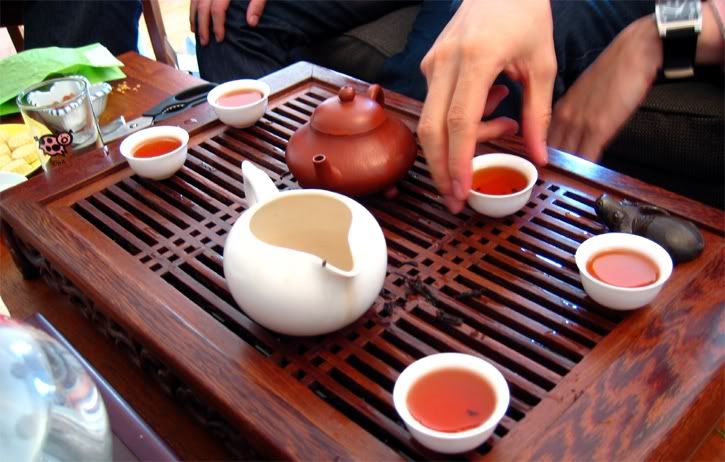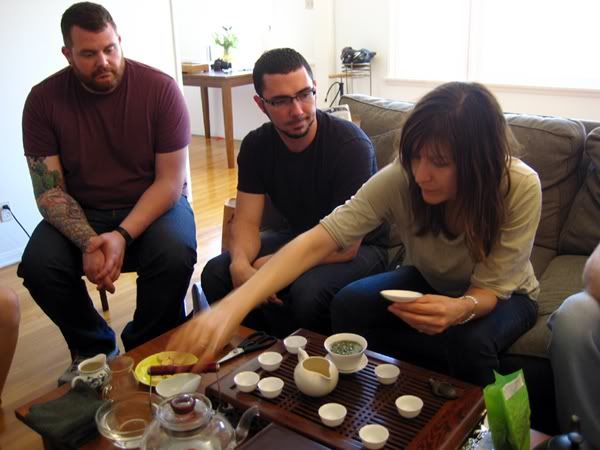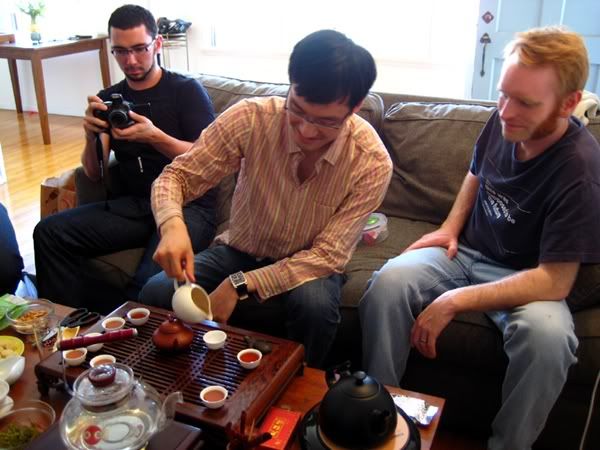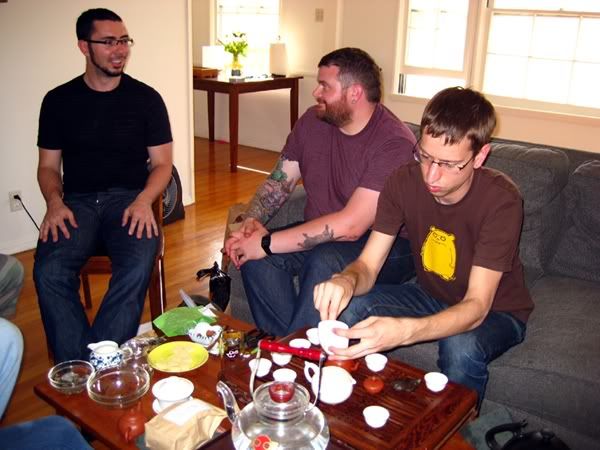In attendance were: Will and Louise (our generous and gracious hosts), MarshalN (our guest of honor), Danica, Jason (aka: Bears), Davin, Nick and myself.
After the ice breakers and introductions, we dived straight into the teas. I tried my best to pay attention to the teas being tasted, but I must admit that the company and conversations were the highlight of this meeting, at least for me. The camaraderie was instantaneous and kept getting better as we exchanged stories, jokes, and news over sips of fine teas. We may not come from the same culture and background, but tea brought us all together in friendships. This was what I've been missing for nearly a year.
The teas: fresh Anji Baicha, fresh Long Jing, 20+ years old Taiwanese oolong, 1980's Baozhong, Wuyi Gu Shu Cha ("wild tea tree"), and Wuyi Da Hong Pao (that I missed because I had to leave early).
The 20+ years old Taiwanese oolong and the Wuyi Gu Shu Cha were quite special. The former, brought by MarshalN, was special in a way that it allows me to learn a characteristic of old oolong's that I never knew before. The smell of the dry leaves reminded me of dried plums or berries that have been dried up for Chinese medicinal purposes. MarshalN mentioned chenpi, or dried tangerine peel. I guess it could be that, too. The taste of the tea itself was decidedly medicinal (oriental) to me. The term "Chinese herbal chest" comes to mind. As expected of such an old and highly roasted tea, it kept giving and giving. The herbal aromas were much stronger in its first 4 or 5 infustions. As we went on brewing it, the tea did not lose much of its full body, though the aromas became subtler. Most of us seemed to prefer the subtler, later brews.
Unexpectedly, however, this old tea was highly astringent. I asked if astringency (rough, pucker-y texture in the mouth and on the tongue) is commonly found in aged oolongs. Apparently, yes. I have always assumed that the older a tea gets, the smoother it should be. My expectation for a silky-smooth mouthfeel was clearly misplaced. This was an education for me.
The Wuyi Gu Shu Cha was decidedly delicious, although unfortunately, I had to leave the party after the second or third brew in order to tend to my daughter, who suddenly developed a fever. This is a tea brought over by Will and Louise from their trip to Wuyi Shan, China, last year. This sample was sourced from a vendor whose teas Corax (of Chadao blog) was so impressed with during his visit to the same locale (click here to read Corax's account of meeting the vendor, Ms. Yu). By the time I had to leave, we had (only) been drinking for about three and a half hours.
Also worth noting was the use of a certain mineral (volcanic?) rocks placed in the fairness cup. Danica and Will swore by the rocks' potent contribution in softening the water, and thus the tea. MarshalN was skeptical at first, but later on admitted to a certain softening of the old oolong he was brewing when the rocks were involved. I remain largely a skeptic, but willing to be open minded about it.
Before I left, MarshalN generously gifted everyone a small earthen Japanese tea cup, each with a unique shape and design in earthy tones. In return, I gave MarshalN a box of Jawa Oolong made from tea leaves grown and harvested near my hometown.
We, LA Teaheads, seem to get the grace of meeting MarshalN only when he is in town on some family occasion. That, unfortunately, does not happen often enough (the last time he visited our metropolis was more than 2 years ago). We tried, though unsuccesfully, to convince MarshalN to move to LA permanently. No way, he said, he won't and can't stand the driving in LA. Oh c'mon, MarshalN, the first two weeks may be tough! After that, you wouldn't think much about being stuck on the 405 freeway for 2 hours, each way.
This meeting was also chronicled on MarshalN's blog and on Bear's Blog.




2 comments:
Hey - I'm a skeptic too about the mineral stones (麦饭石, I believe)! I don't actually normally use them, and if you use too many or leave them in too long, I think it gives the water a kind of unpleasant "rocky" taste.
They does seem to improve the taste with some teas. However, and this may also be the placebo effect, I do find that too much of them seems to give me a stomach ache, and Danica mentioned the same thing.
See also http://en.wikipedia.org/wiki/Maifan_Stone.
Will, I'd like to try using the stone again someday soon with you. I forgot to steal one from you. :) Thanks for the additional info. It was nice seeing you and Louise again.
Post a Comment